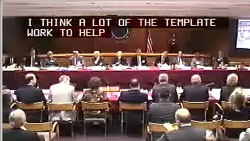MSRC supplements emergency response best practices with 20 new items
The Media Security and Reliability Council (MSRC)yesterday adopted 18 national and two local best practices related to response and recovery from natural and man-made disasters to add to the 63 best practices it approved in December.

The FCC met this morning in Washington D.C. to adopt 18 national and two local best practices related to response and recovery from natural and man-made disasters.
The new proposals grew out of an event in Tampa, Fla., sponsored by the council’s Public Communications and Safety Working Group where many of the previously adopted best practices were taken for a “test drive,” in the words of committee chair John Eck, president of Network Operations for NBC.
At the event, the working group and the MSRC’s Communications Infrastructure Security, Access and Restoration Committee met with local broadcasters, the Florida Association of Broadcasters, the local cable association and others to assess the best practices.
Additionally, the media’s response to the blackout in New York City and Hurricane Andrew provided insight used to develop the new best practices.
Among the new best practices are:
- the establishment of local government emergency operations centers with basic audio and video equipment that can be interfaced with local media;
- regular meetings between the technical staffs of local government emergency responders and the media;
- establishing a public education program with a focus on preparedness, response and recovery;
- the judicious use of the emergency communications system to avoid from dulling the public’s perception of the importance of emergency messages;
- additional Emergency Alert System entry points from the FM subcarrier;
- steps to assure the physical security of the broadcast studio and transmitter facility, including back-up power, redundant communications into and out of the station and redundant facilities where practical;
- steps to assure that disruptions to the supply chain from a disaster won’t deny stations what they need to stay on the air in times of local or national emergency.
The MSRC meeting was the fifth and final gathering of this group of members under the council’s two-year charter. In his closing statements, FCC Chairman Michael Powell thanked council members for their work and warned the media that they may likely be the target of future terror attacks.
Get the TV Tech Newsletter
The professional video industry's #1 source for news, trends and product and tech information. Sign up below.
Powell also announced that David Barrett, president and CEO of Hearst-Argyle Television, will be the incoming chairman of the new Media Security and Reliability Council.
For more information visit www.fcc.gov.
